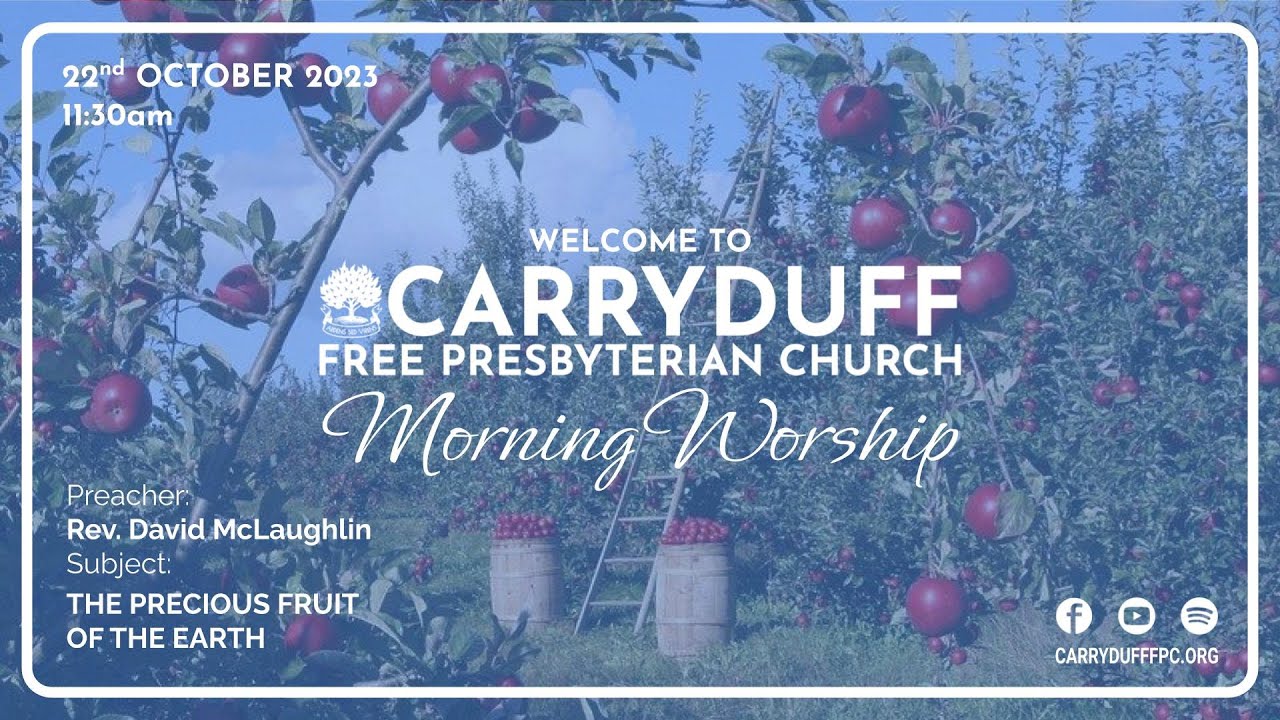Date: SUN 7:00pm 17th August 2025
Preacher: Rev. David McLaughlin
Bible Reference: Amos 8:1-2
Thus hath the Lord GOD shewed unto me: and behold a basket of summer fruit. And he said, Amos, what seest thou? And I said, A basket of summer fruit. Then said the LORD unto me,
The end is come upon my people of Israel;
I will not again pass by them any more.
Sermon Summary: Spiritual Lessons from the Basket of Summer Fruit (Amos 7:10–8:7)
Introduction and Context
The sermon focuses on the biblical text from Amos 7:10–15 and Amos 8:1–7, using the Authorised Version (King James Bible). The preacher begins by guiding the congregation to locate the Book of Amos in the Old Testament, situated after Hosea and Joel in the Minor Prophets. The sermon is titled “Spiritual Lessons from the Basket of Summer Fruit,” drawing primarily from Amos 8:1–2, where God shows Amos a vision of a basket of summer fruit, symbolising the impending judgment on Israel. The sermon is structured around three key points: the prophet addressed, the portrait presented, and the punishment prophesied.
1. The Prophet Addressed (Amos’ Background and Calling)
The sermon introduces Amos as an unlikely prophet chosen by God. Amos, a herdsman and gatherer of sycamore fruit from Tekoa in Judah, was not a trained prophet or from a prophetic lineage (Amos 7:14). He was an ordinary, hardworking countryman, tending livestock and working the fields. Despite his humble background, God called him to prophesy to the northern kingdom of Israel during the reign of Jeroboam II, a time of apostasy and moral decay, with Bethel as the centre of false worship.
Amos faced opposition from Amaziah, the priest of Bethel, who accused him of conspiring against the king and urged him to return to Judah (Amos 7:10–13). Amos responded by affirming his divine calling, stating that God took him from his work as a herdsman and commanded him to prophesy (Amos 7:15). The preacher underscores that God often chooses ordinary individuals for His work, referencing 1 Corinthians 1:26–29, which highlights God’s use of the humble to confound the mighty. Amos is presented as a man of prayer (interceding in Amos 7:2–6) and a faithful messenger who received divine revelations through four visions: locusts, fire, a plumb line, and the basket of summer fruit (Amos 7:1–8:2). His role as a seer demonstrates God’s practice of revealing His plans to His prophets (Amos 3:7).
The preacher draws a contemporary application, noting that the church needs such faithful, ordinary individuals in its pulpits to proclaim God’s word with conviction, especially in a time of spiritual decline.
2. The Portrait Presented (The Basket of Summer Fruit)
The vision of the basket of summer fruit (Amos 8:1–2) serves as a vivid symbol with multiple layers of meaning:
- Association with the Harvest: The basket represents the final harvest, linked to the Jewish Feast of Tabernacles, which occurs in September or October and signifies the completion of the harvest season. This feast is a time of joy but also a reminder of preparation for the coming winter, drawing a parallel to spiritual preparation for eternity.
- Symbolism of Preparation: The preacher connects the basket to the need for readiness before life’s trials or God’s judgment, likening it to Paul’s exhortation to Timothy to “come before winter” (2 Timothy 4:21). Christ’s life, death, resurrection, and ascension are cited as God’s provision for humanity’s spiritual preparation, urging listeners to consider whether they are ready to meet God.
- The Nature of the Fruit: The fruit, possibly sycamore fruit (linked to Amos’ occupation in Amos 7:14), requires bruising to ripen and become sweet. This is likened to Christ’s suffering on the cross, where His “bruising” (Isaiah 53, Genesis 3:15) brings redemption. The preacher recounts a story of a man in Cavan who came to faith after suffering a severe injury, illustrating how God uses trials to draw people to Himself.
- Fruit’s Prosperity and Perishability: The fruit symbolises God’s provision, both temporal (physical sustenance) and spiritual (the fruit of the Spirit, Galatians 5:22–25). However, like fruit left uneaten, it can rot quickly, representing the fleeting opportunity for repentance. The preacher warns that Israel’s refusal to heed God’s call through Amos left them like rotting fruit, facing judgment.
3. The Punishment Prophesied
The basket of summer fruit signifies the end of God’s patience with Israel (Amos 8:2: “The end is come upon my people of Israel; I will not again pass by them any more”). The preacher explains that this vision marks the close of God’s mercy, with no further intercession from Amos (unlike in earlier visions). Israel’s judgment came 40 years later with the Assyrian invasion, fulfilling God’s warning.
Israel’s sins included oppressing the poor, hypocrisy, idolatry, greed, and dishonest trade practices (Amos 8:4–6). These led to a spiritual famine—not of bread or water, but of hearing God’s word (Amos 8:11). The preacher draws parallels to modern society, noting the abandonment of biblical principles, such as the Ten Commandments and the Lord’s Prayer, and the lack of scriptural knowledge among professing Christians.
The sermon concludes with a poignant story of two men, Duncan and Johnny, who parted ways at a crossroads after a gospel meeting. Duncan chose to seek salvation, praying for mercy in a barn, while Johnny rejected the gospel and later, in a nursing home, refused a gospel tract, admitting he had made his choice years earlier. This illustrates the consequences of rejecting God’s call, reinforcing the urgency of responding to the gospel before the opportunity passes.
Conclusion
The sermon calls the congregation to reflect on Amos’ example as an ordinary man used by God, the basket of summer fruit as a symbol of preparation and urgency, and the certainty of divine judgment for unrepented sin. The preacher urges listeners to respond to God’s call today, lest they face the tragedy of a life separated from Him, like Johnny at the crossroads.
Key Themes
- God’s Calling of the Humble: Amos’ story shows that God equips ordinary individuals for His service.
- Urgency of Repentance: The basket of summer fruit symbolises the limited time to respond to God’s grace.
- Consequences of Sin: Israel’s judgment warns of the consequences of rejecting God’s word, applicable to individuals and society today.
- Christ’s Redemptive Work: The bruising of sycamore fruit parallels Christ’s suffering, offering salvation to those who accept it.
The sermon is a call to faithfulness, repentance, and preparation for eternity, grounded in the vivid imagery of Amos’ vision and the timeless truth of God’s word.
Subscribe to the podcast here:
Spotify Podcasts | Apple Podcasts | Pocket Casts
Email | RSS | more information here








